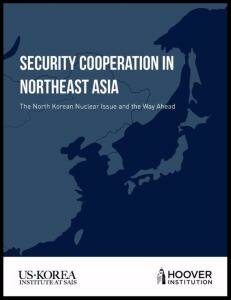North Korea conducted its fifth and most powerful nuclear test in September 2016. It is also making significant progress on its delivery systems, rapidly expanding its stockpile of fissile materials, and steadily improving on its nuclear weapon designs. There is growing concern that if this process continues, North Korea could soon become a clear and present danger not only to Northeast Asia, but also to the United States.
With this in mind, the US-Korea Institute at SAIS partnered with the Hoover Institution at Stanford University to convene some of the leading experts on Northeast Asia security issues to take stock of the issue and consider what steps can be taken to stabilize the situation and halt North Korea’s development of weapons of mass destruction. The two-day conference was held at Stanford University in mid-June and was co-chaired by former Secretary of State George P. Shultz and former Secretary of Defense William J. Perry.
The following report is a summary of the main points discussed by the participants, with the primary takeaway that there is a need for a comprehensive policy review along the lines of the “Perry Process” fifteen years ago.
Download the report, “Security Cooperation in Northeast Asia: The North Korean Nuclear Issue and the Way Ahead”




